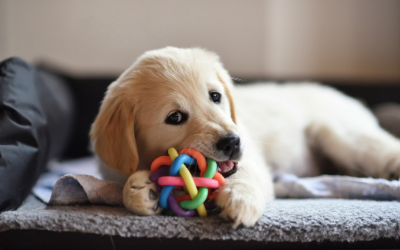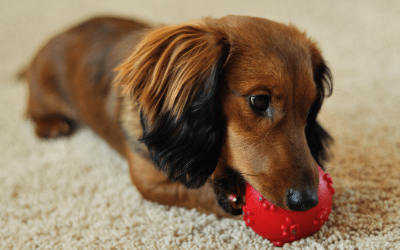Dog Baby Teeth Falling Out Can I Play With It
My puppy has started biting my hands, my legs, my children's legs - pretty much whatever object he tin can get his mouth on. What is going on? 
Your puppy is teething, the same manner that human babies and children abound new teeth during their development. Similar a homo, your pup first grows a prepare of babe teeth (besides called primary or deciduous, meaning they fall out). These teeth are pointed and sharp, which is why they are sometimes referred to every bit needle teeth.
Dogs take 28 deciduous teeth and stop upwards with 42 permanent teeth. Yous may find deciduous on the flooring, but more probable, your puppy will harmlessly consume the teeth while he is eating. Information technology is not unusual for some bleeding to occur when the teeth fall or are falling out, but the corporeality is minuscule and owners usually notice it simply if at that place is some mild scarlet staining on a chew toy.
Why is everything being attacked?
Puppies will chew on people, furniture, and other objects (including ones y'all value) that are within their attain; this is part of normal puppy behavior. Dogs learn much about the world effectually them through how things feel, and a dog's main means of touching and grabbing things is with its mouth.
This tendency is particularly pronounced in breeds known to be "mouthy," such as retrievers. Chewing also seems to convalesce what is assumed to be discomfort associated with the teething process.
When will my domestic dog's baby teeth fall out?
Puppies brainstorm teething at around 3 weeks, and by approximately 6 weeks, all of their deciduous teeth volition have erupted. The incisors (at the front end of the mouth) and the canine teeth (the fangs) erupt offset, followed by the premolars. Dogs do not accept whatsoever baby molars. At around 12 weeks, the deciduous teeth brainstorm to fall out, and the permanent teeth begin to erupt. Normally by 6 months of age, all permanent teeth take erupted, and all deciduous teeth have fallen out.
Are there whatsoever common dental problems in immature dogs?
Bug with deciduous teeth are few and far between. It is rare that a pup volition accept a dental problem that is serious enough to require avant-garde intervention or referral to a veterinary dentist. Some breeds, specially smaller breeds and brachycephalic (brusque-nosed) breeds, have a tendency to retain some of their deciduous teeth. The near usual site is the upper canine teeth, although it tin can happen anywhere. Retained deciduous teeth tin can cause malocclusion (misaligned teeth leading to a poor bite) and discomfort. They besides predispose dogs to future dental problems. Food can become trapped between the retained deciduous teeth, the permanent teeth, and the gingiva (gums), which can pb to periodontal (dental) disease. Retained deciduous teeth need to exist removed. Usually a simple process, it is commonly performed at the time of the pet's neutering or spaying.
What are acceptable chew toys, and which ones should be avoided? 
Because dogs tend to chew virtually everything, almost everything has been constitute to cause problems. This goes for rawhides, pigs' ears, or other parts of animals given to dogs to chew (some owners swear by the "cracking stick," which is the stale or cooked amputated penis of a bull), bones, constructed toys, tennis balls, etc. Some of these objects have caused gastrointestinal blockages or intestinal punctures, which often require surgery and can be life-threatening; others have blocked the throat, causing dogs to asphyxiate.
Notwithstanding these facts, consider that millions of dogs have been chewing millions of objects for years, most without incident. So while the risk does appear to be depression, every bit with most activities, it cannot be eliminated. Watch your puppy when he begins chewing, and talk to your veterinary about which chew toys are the safest for your puppy. It is important to supervise your puppy even when he is chewing on recommended toys every bit no toy is 100% prophylactic.
"It is important to supervise your puppy fifty-fifty when he is chewing on recommended toys as no toy is 100% rubber."
Conduct in mind that some objects that are safe from the signal of view of ingestion or inhalation, may still not exist very good for your dog'southward teeth. Most veterinarian dentists recommend against assuasive puppies and older dogs to chew anything hard. That would include objects made of nylon, besides as basic and antlers. Veterinary dentists often sum up this recommendation with, "Don't let your dog chew anything that won't bend."
What should I do about my puppy's chewing behaviors that I don't like?
Do non reward behavior you practice not want, and do not let others reward it either. If your puppy is chewing on your easily or any other body part, yelp a high pitched shriek like a puppy makes, pull your hand away, and get play elsewhere.
"Exercise not reward behavior yous do non want, and do not let others reward it either."
In that location is no consensus about the all-time style to teach puppies non to chew. Some methods may even seem contradictory because what may work for one dog may be inappropriate for another. Check with your veterinary for a personalized recommendation.
Puppies are naturally energetic and curious, and then endeavor to redirect that energy elsewhere past including lots of exercise, training, and effort feeding from puzzle toys rather than a bowl. Do not leave tempting items similar clothes, shoes, or children's toys where your puppy can reach them. At the same time provide lots of prophylactic chew toys. Keep chew toys "fresh" past rotating them, only having a few out at any i fourth dimension. Supervise your puppy so he does non accept the opportunity to chew something he shouldn't.
My children like playing rough with the puppy, and they say that they don't mind the occasional scratch or gentle bite. Is this okay?
No! Permitting this behavior teaches your pet that easily are acceptable toys to use as he or she pleases. Your dog is not but learning that it is okay, only the pup is fifty-fifty being rewarded for this behavior when your children continue playing after being bitten or scratched.
Volition my domestic dog always stop chewing everything?
Excessive chewing behavior seems to subside around 18 months of age but will continue to some degree, depending on the dog, for his or her whole life. Remember that chewing, licking, and mouthing are normal behaviors for dogs every bit a way of exploring and learning, and conveying objects from one place to the side by side. If chewing is excessive or aggressive, consult your veterinarian for behavior modification advice.
Should I brush my canis familiaris's teeth?
Getting your puppy used to having something in his or her rima oris other than food or a chew toy is a good idea. You besides want to be able to retrieve objects from your canis familiaris's mouth or wait in there without take a chance of injury to your hand. In add-on, because dental problems are amongst the almost mutual (and plush) bug seen in dogs, getting your dog to tolerate brushing at an early age will become you started on a path that volition help preclude many of these problems.
Buy a toothbrush and toothpaste suitable for dogs (human toothpaste is not appropriate for dogs and can make them sick). Get-go by but gently introducing the brush and paste, allowing your pup to sniff and lick the brush. All the same, exercise not force the matter. Enquire your veterinary to demonstrate brushing a technique and give yous advice for getting your domestic dog used to the routine. Almost dogs can be taught to tolerate or fifty-fifty relish daily teeth brushing. For more information, see the handout "Brushing Your Dog'south Teeth".
Source: https://vcahospitals.com/know-your-pet/teeth-teething-and-chewing-in-puppies
0 Response to "Dog Baby Teeth Falling Out Can I Play With It"
Post a Comment